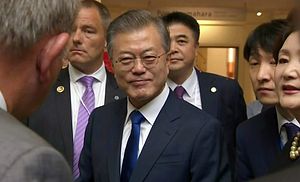Although his approval ratings have remained relatively high this year, bolstered in large part by public approval for his engagement-focused North Korea policy, South Korean President Moon Jae-in’s lackluster domestic policy, particularly his failure to address economic concerns, has taken its toll.
Moon’s approval ratings hit 47.1 percent in mid-December, the lowest since he took office in May 2017.
While, of course, Moon must continue to push forward on the foreign policy front, particularly as talks between the United States and North Korea appear to be at an impasse, he will need to spend more time focusing on domestic policy in 2019 to maintain his political support. Here are five key issues that face South Korea that will need particular attention in the coming year.
1. Economic Doldrums
Concerns about the state of the economy are at the top of the priority list for many South Koreans, particularly young people looking for employment. Despite the Moon administration’s attempts at invigorating the job market, including by raising the minimum wage and capping the number of hours employees can work each week, youth unemployment and underemployment remains high.
In the last few weeks, several Korean think tanks have released forecasts for 2019, and the outlook appears bleak. According to the Hyundai Research Institute, the country’s economy will only grow about 2.5 percent next year, and is headed for a low point in the second half of 2019 or early 2020.
While some of the economic policies mentioned above may take some time to show dividends, Moon will need to find quicker and more effective ways to boost economic growth if he wants to regain political support from disillusioned young Koreans.
2. Aging Population
Although South Korea’s aging population has been a concern for years, the country may be close to reaching a breaking point. The country’s overall fertility rate has consistently dropped for years, reaching an all-time low of just 0.95 babies per woman at the end of 2018. This rate is less than half the 2.1 babies per woman needed to maintain a country’s population.
The Moon administration unveiled new emergency measures in December aimed at making it easier for couples to afford more children, including massive subsidies for medical care and daycare as well as an increase in paid paternity leave. The administration also acknowledged the need to address discrimination in the workplace, a major deterrent for women who fear losing their job after getting pregnant. But solving that entrenched issue will take a lot more dedication and focus if South Korea really wants to find a sustainable solution to the low birth rate.
On the other end of the spectrum, South Korea’s growing elderly population is also facing major difficulties. The country’s elderly poverty rate is 63.3 percent, the highest in the OECD, and 31 percent of people aged 65 have to take low-wage jobs after retirement to try to make ends meet. Suicide rates among the elderly are also particularly high. In tackling its coming demographic crisis, the Korean government will also have to take steps to address these issues, not just encouraging more births.
3. Women’s Rights
From an enthusiastic embrace of the Me Too movement to massive protests against spy cams and revenge porn, South Korea grappled with women’s rights throughout this year. In fact, in Twitter Korea’s list of most tweeted-about social issues this year, the top three terms were all explicitly related to women’s issues: “School Me Too,” “Feminism,” and “Spy Cam.”
Nevertheless, the movement suffered some setbacks toward the end of the year, from Governor Ahn Hee Jung’s acquittal on rape charges to rapper San E’s musical rants against Korea’s feminists. The coming year will show if women’s rights activists and supporters can sustain the movement despite pushback. And the Moon administration will have to decide the role it wants to play in the movement – although Moon made his support of the Me Too movement clear at the beginning of the year, the Korean government has largely stayed clear of these issues so far.
4. Safety
When he ran for office in spring 2017, one of President Moon’s 12 pledges he promised to focus on should he win was building a safer Korea free from unnecessary accidents. Unfortunately, 2018 saw a spate of incidents, from major and deadly fires to helicopter crashes to train derailments.
While many of these individual incidents brought significant public outcry over cut corners and lax inspections, there has been surprisingly little uproar about general safety concerns. However, if this trend continues in 2019, more people are sure to take note. Moon would do well to focus on reforming safety regulations across the board – not only to protect his political life but the lives of his citizens as well.
5. Environment
One of the biggest recurring stories in Korea over the last few years has been the high level of air pollution that regularly blanket the country, but the issue really escalated in 2018. Starting from the very beginning of the year, extremely high levels of particulate matter in the air triggered emergency measures. Unfortunately, the Korea Meteorological Administration has predicted that this winter will be particularly severe for fine dust pollution.
While some still argue over whether the pollution is caused by domestic factors or whether dust blown over from China is more to blame, the fact remains that the Korean government will have to take drastic regulatory and diplomatic measures to cut back on the amount of dangerous pollutants in Korea’s air.
Jenna Gibson is a doctoral candidate in political science at the University of Chicago and a Korea blogger for The Diplomat. You can find her on Twitter at @jennargibson.

































